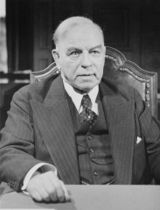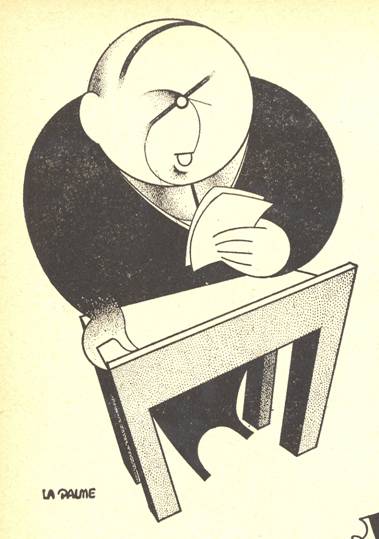
|
|
| Date Published: |
L’Encyclopédie de l’histoire du Québec / The Quebec History Encyclopedia
William Lyon Mackenzie King
[He remained in power, undefeated, through the elections of 1940 and 1945, until his resignation in 1948. Mackenzie King had the distinction to take Canada through the Second World War (1939-1945). Under his leadership, Canada fought an effective war, putting into the field around 1,000,000 men, while equipping and feeding many others. As Britain’s main ally within the Commonwealth, Canadian troops distinguished themselves through the Battle of Britain, in the North African and Italian campaigns and in the Normandy invasion in 1944. Throughout the war, Mackenzie King managed to keep the people of Canada working together, although the plebiscite of 1942 and the conscription crisis of 1944 strained relations between Quebecers and the rest of Canadians. His reelection in 1945, winning the majority of the seats in Quebec while he retained substantial support in the rest of the country, testifies to his ability as prime minister. King was a crafty politician, with an ear to the ground, quick in sensing the prevailing
mood of Canadians, and able to act decisively when it was necessary. In recent years, his reputation has been somewhat tarnished by stories of his eccentricities and his “dialogue” with the spirit world. However, these do not alter in a substantial way his remarkable record in office. We associate the administration of King with major advances in the international status of Canada, leading to the Statute of Westminster that recognized essentially the independence of Canada, with the creation of a Canadian citizenship (1947), the establishment of Old Age pensions (1927), of Air Canada (1937), of the National Film Board (1939), of Unemployment Insurance (1940) and Family Allowances (1945). His creation of the Royal Commission on Dominion-Provincial relations (known as the Rowell-Sirois Commission) led to profound changes in Canadian federalism. King is also credited with the appointment of the first female senator (Cairine Wilson) in 1930. On the other hand, King is criticized for failing to come to the help of Jewish refugees fleeing the persecution of the Nazis in the 1930’s and for his support of the policy of appeasement of Nazi Germany throughout the same decade, failing to see the ruthless nature of Hitler. In the post-war period, he favoured renewed immigration but did not wish to see “a fundamental alteration in the character of our population”.] He was created a C.M.G. in 1906, and an imperial privy councilor in 1922. He was an LL.D. of Queen's University (1919), Toronto (1922), Harvard (1923), Edinburgh (1923), Yale (1924), and a D.C.L. of Oxford (1923). In 1910 he was elected a fellow of the Royal Society of Canada. He was the author of The secret of heroism (New York, 1906), Industry and humanity (Toronto, 1918), and The message of the carillon (Toronto, 1927). He [was] not married. [The diaries of Mackenzie King are available on-line and contain much material of interest to the student of Canadian politics through the 1930's and the 1940's.]
Source: W. Stewart WALLACE, ed., “William Lyon Mackenzie King”, in The Encyclopedia of Canada, Vol. III, Toronto, University Associates of Canada, 1948, 396p., pp. 334-335. Parts between brackets […] were added by Claude Bélanger.
|
© 2007
Claude Bélanger, Marianopolis College |
|

